|
Did Bush Know?
Fake Terrorism Has Always Cleared the Way to War and Dictatorship
by Michael Rivero
It's the oldest trick in the book, dating back to Roman times: Create the enemies you need.
 In 70 BC, an ambitious minor politician and extremely wealthy man, Marcus Licineus Crassus, wanted to rule Rome. Just to give you an idea of what sort of man Crassus really was, he is credited with inventing the fire brigade. But in Crassus' version, his fire-fighting slaves would race to the scene of a burning building whereupon Crassus would offer to buy it on the spot for a tiny fraction of it's worth. If the owner sold, Crassus' slaves would put out the fire. If the owner refused to sell, Crassus allowed the building to burn to the ground. By means of this device, Crassus eventually came to be the largest single private land holder in Rome, and used some of his wealth to help back Julius Caesar against Cicero.
In 70 BC, an ambitious minor politician and extremely wealthy man, Marcus Licineus Crassus, wanted to rule Rome. Just to give you an idea of what sort of man Crassus really was, he is credited with inventing the fire brigade. But in Crassus' version, his fire-fighting slaves would race to the scene of a burning building whereupon Crassus would offer to buy it on the spot for a tiny fraction of it's worth. If the owner sold, Crassus' slaves would put out the fire. If the owner refused to sell, Crassus allowed the building to burn to the ground. By means of this device, Crassus eventually came to be the largest single private land holder in Rome, and used some of his wealth to help back Julius Caesar against Cicero.
In 70 BC Rome was still a Republic, which placed very strict limits on what Rulers could and couldn't do. But Crassus had no intentions of enduring such limits to his personal power, and contrived a plan.
Crassus seized upon the slave revolt led by Spartacus in order to strike terror into the hearts of Rome, whose garrison Spartacus had already defeated in battle. But Spartacus had no intention of marching on Rome itself, a move he knew would be suicidal. Spartacus and his band wanted nothing to do with the Roman empire and had planned from the start merely to loot enough money from their former owners in the Italian countryside to hire a mercenary fleet in which to sail to freedom.
Sailing away was the last thing Crassus wanted Spartacus to do. He needed a convenient enemy with which to terrorize Rome itself for his personal political gain. So Crassus bribed the mercenary fleet to sail without Spartacus, then positioned two Roman legions in such a way that Spartacus had no choice but to march on Rome.
Terrified of the impending return of the army of gladiators, Rome declared Crassus Praetor. Crassus then crushed Spartacus' army and even though Pompey took the credit, Crassus was elected Consul of Rome the following year.
With this maneuver, the Romans surrendered their Republican form of government. Soon would follow the first Triumvirate, which consisted of Crassus, Pompey, and Julius Caesar, followed by the reign of the god-like Emperors of Rome.
The Romans were hoaxed into surrendering their Republic, and accepting the rule of Emperors.
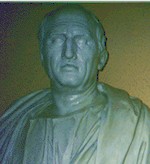 Julius Caesar's political opponent, Cicero, for all his literary accomplishments, played the same games in his campaign against Julius Caesar, claiming that Rome was falling victim to an internal "vast right wing" conspiracy in which any expressed desire for legislative limits on government was suspicious. Cicero, in order to demonstrate to the Romans just how unsafe Rome had become, hired thugs to cause as much crime and chaos as possible, and then campaigned on a promise to end the internal strife if elected and granted extraordinary powers.
Julius Caesar's political opponent, Cicero, for all his literary accomplishments, played the same games in his campaign against Julius Caesar, claiming that Rome was falling victim to an internal "vast right wing" conspiracy in which any expressed desire for legislative limits on government was suspicious. Cicero, in order to demonstrate to the Romans just how unsafe Rome had become, hired thugs to cause as much crime and chaos as possible, and then campaigned on a promise to end the internal strife if elected and granted extraordinary powers.
What Cicero only dreamed of, Adolph Hitler succeeded in doing. 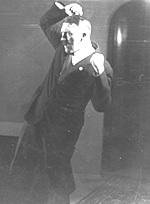 Elected Chancellor of Germany, Hitler, like Crassus, had no intention of living with the strict limits to his power imposed by law.
Unlike Cicero, Hitler's thugs were easy to recognize - they all wore the same brown shirts - but their actions
were no different than those of their Roman predecessors. They staged beatings, destroyed property, set fires, caused all sorts of chaos, while Hitler made speeches promising he could end the wave of crime and terrorism if he were granted extraordinary powers. Elected Chancellor of Germany, Hitler, like Crassus, had no intention of living with the strict limits to his power imposed by law.
Unlike Cicero, Hitler's thugs were easy to recognize - they all wore the same brown shirts - but their actions
were no different than those of their Roman predecessors. They staged beatings, destroyed property, set fires, caused all sorts of chaos, while Hitler made speeches promising he could end the wave of crime and terrorism if he were granted extraordinary powers.
Then the Reichstag, the German legislature, burned down. The fire was staged - and reported - as a terrorist attack, when in fact it later turned out Hitler's own Nazi Party had secretly planned it.
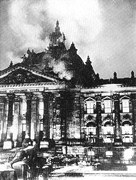 Thus the Germans were hoaxed into surrendering their Republic; in fear they accepted the total rule of Der Fuhrer.
Thus the Germans were hoaxed into surrendering their Republic; in fear they accepted the total rule of Der Fuhrer.
Although state-sponsored schools don't tell you, governments have routinely relied on hoaxes to sell their agendas to otherwise reluctant people. The Romans accepted the Emperors and the Germans accepted Hitler - not because they wanted to, but because the carefully crafted illusions appeared to threaten them and leave them no other choice.
Our government too has used hoaxes to create the illusion that We The People have no choice but to accept whatever direction the government wishes to take us.
In 1898, Joseph Pulitzer's New York World and William Randolph Hearst's New York Journal both argued for American intervention in Cuba. Hearst went so far as to dispatch a photographer to Cuba to photograph the coming war with Spain. When the photographer asked just what war that might be, Hearst reportedly replied, "You take the photographs, I will provide the war." True to his word, Hearst's newspaper began publishing stories about great atrocities that the Spanish were committing against the Cuban people, most of which turned out to be complete fabrications.
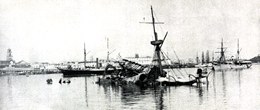 Then the USS Maine, which was lying in Havana harbor in a show of American resolve to protect American interests, exploded violently. It was the night of February 15, 1898, and Captain Sigsbee, the commander of the Maine, urged that no assumptions of enemy attack be made until there was a full investigation of the causes of the explosion. For this, Captain Sigsbee was excoriated in the press for "refusing to see the obvious." The Atlantic Monthly declared flat out that to suppose the explosion to be anything other than a deliberate act by Spain was "completely at defiance of the laws of probability." Then the USS Maine, which was lying in Havana harbor in a show of American resolve to protect American interests, exploded violently. It was the night of February 15, 1898, and Captain Sigsbee, the commander of the Maine, urged that no assumptions of enemy attack be made until there was a full investigation of the causes of the explosion. For this, Captain Sigsbee was excoriated in the press for "refusing to see the obvious." The Atlantic Monthly declared flat out that to suppose the explosion to be anything other than a deliberate act by Spain was "completely at defiance of the laws of probability."
And under the slogan "Remember the Maine," Americans went to war with Spain, eventually winning the Philippines (and snatching independent Hawaii for good measure).
Years later, in 1975, an investigation led by Admiral Hyman Rickover examined the data recovered from a 1911 examination of the wreck and concluded that there had been no evidence of an external explosion. The most likely cause of the sinking was a coal dust explosion in a coal bunker imprudently located next to the ship's magazines. Captain Sigsbee's caution had been well founded.
In 1941, President Franklin Delano Roosevelt needed a war. He needed the fever of a major war to mask the symptoms of a deathly ill economy struggling back from the Great Depression (and making Socialism increasingly attractive). Roosevelt wanted a war with Germany to stop Hitler, but the American people, still struggling to feed and clothe themselves, were opposed to any wars. Roosevelt violated neutrality with "Lend Lease," and then even ordered the sinking of several German ships in the Atlantic, but Hitler refused to be provoked.
 Still, Roosevelt needed an enemy, and if America would not willingly attack that enemy, then one would have to be maneuvered into attacking America, much as Crassus had maneuvered Spartacus into attacking Rome. Still, Roosevelt needed an enemy, and if America would not willingly attack that enemy, then one would have to be maneuvered into attacking America, much as Crassus had maneuvered Spartacus into attacking Rome.
A path to war appeared when Japan signed the tripartite agreement with Italy and Germany, with all parties pledging each other's mutual defense. Whereas Hitler wouldn't declare war on the United States no matter what the provocation, the means to force Japan to do so were readily at hand.
The first step was to place oil and steel embargoes on Japan, using Japan's wars on the Asian mainland as a reason. This forced Japan to consider seizing the oil and mineral rich regions in Indonesia. With the European powers militarily exhausted by the war in Europe, the United States was the only power in the Pacific able to stop Japan from invading the Dutch East Indies, and by moving the Pacific fleet from San Diego to Pearl Harbor, Hawaii, Roosevelt made a pre-emptive strike on Pearl Harbor a mandatory first step in any Japanese plan to extend its empire into the "southern resource area."
Roosevelt boxed in Japan just as completely as Crassus had boxed in Spartacus. Japan needed oil, and they had to invade Indonesia to get it, but to do so they first had to remove the American fleet at Pearl Harbor. There really was no other course open to them.
To enrage the American people as much as possible, Roosevelt needed the first overt attack by Japan to be bloody and to appear to be a sneak attack, as the Japanese had done to the Russians. Roosevelt and his associates made sure that the commanders in Hawaii - General Short and Admiral Kimmel - were kept in the dark as much as possible about the location of the Japanese fleet and it's intentions. Then he later scapegoated them for the attack. (Congress recently exonerated Short and Kimmel, posthumously restoring them to their former ranks).
But as the Army board had concluded at the time, and as numerous subsequent de-classified documents have confirmed, Washington DC knew the attack was coming, knew exactly where the Japanese fleet was, and knew where it was headed.
On November 29th, Secretary of State Hull showed United Press reporter Joe Leib a message with the time and place of the attack, and the New York Times in it's special Dec. 8, 1941 Pearl Harbor edition, on page 13, reported that the time and place of the attack had been known in advance!
The much repeated claim that the Japanese fleet maintained radio silence on it's way to Hawaii is also a lie. Among other intercepts still held in the Archives of the NSA is the uncoded message sent by the Japanese tanker Shirya stating, "proceeding to a position 30.00 N, 154.20 E. Expect to arrive at that point on 3 December." (This point is not far from the Hawaiian coast.)
Modern Wars are the Same
President Lyndon Johnson wanted a war in Vietnam in 1964. He wanted to help his friends who owned defense companies do a little business, and he needed to get the Pentagon and CIA to quit trying to invade Cuba. So he soon needed a provocation to convince the American people that there was really "no other choice" than war.
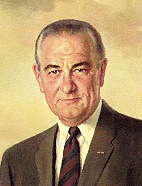 On August 5, 1964, newspapers across America reported "renewed attacks" against American destroyers operating in Vietnamese waters, specifically the Gulf of Tonkin. The official story was that North Vietnamese torpedo boats launched an "unprovoked attack" on the USS Maddox while it was on "routine patrol." On August 5, 1964, newspapers across America reported "renewed attacks" against American destroyers operating in Vietnamese waters, specifically the Gulf of Tonkin. The official story was that North Vietnamese torpedo boats launched an "unprovoked attack" on the USS Maddox while it was on "routine patrol."
The truth is that the USS Maddox was involved in aggressive intelligence gathering in coordination with actual attacks by South Vietnam and the Laotian Air Force against targets in North Vietnam. The truth is also that there was no attack by torpedo boats against the USS Maddox. Captain John J. Herrick, the task force commander in the Gulf, cabled Washington DC that the report was the result of an "over-eager" sonarman who had picked up the sounds of his own ship's screws and panicked.
But even with this knowledge that the report was false, Lyndon Johnson went on national TV that night to announce the commencement of air strikes against North Vietnam, "retaliation" for an attack that had never occurred.
 Daniel Ellsberg, the DOD insider who blew the whistle on Vietnam and leaked the Pentagon Papers, confirmed in his recent book, Secrets: A Memoir of Vietnam and the Pentagon Papers, that there never was any attack on the Maddox. But off we went to war. Daniel Ellsberg, the DOD insider who blew the whistle on Vietnam and leaked the Pentagon Papers, confirmed in his recent book, Secrets: A Memoir of Vietnam and the Pentagon Papers, that there never was any attack on the Maddox. But off we went to war.
 Fast forward to the first President Bush. He wanted a war in Iraq. Like Crassus, Bush was motivated by money, oil money specifically. The OPEC alliance was failing to keep limits on oil production in the Mideast, and the market was being glutted with oil pumped from Iraq, which sits atop roughly 1/3 of the oil in the entire region.
Fast forward to the first President Bush. He wanted a war in Iraq. Like Crassus, Bush was motivated by money, oil money specifically. The OPEC alliance was failing to keep limits on oil production in the Mideast, and the market was being glutted with oil pumped from Iraq, which sits atop roughly 1/3 of the oil in the entire region.
George I wanted a war to stop that flow of oil, to keep prices and profits from falling any further than they already had, so like Roosevelt he needed the "other side" to make the first move.
Iraq had long been trying to acquire greater access to the Persian Gulf, feeling limited on their narrow strip of land along Kuwait's northern border. Iraqi
interests were in close proximity with hostile Iran, and George Bush, who had been covertly
arming Iraq during its war with Iran, sent word via April Glaspie that the United States
would not intervene if Saddam Hussein grabbed a larger part of Kuwait. Saddam fell
for the bait and invaded.
But Americans still were not about to send their sons and daughters to risk their
lives for petroleum products, so George I arranged a hoax. A public relations
firm, which has grown rich on taxpayer money by being most industrious
and creative liars, concocted a monumental fraud in which the
daughter of the Kuwaiti Ambassador to the United States went on TV pretending
to be a nurse. She related a horror story in which Iraqi troops looted the incubators from a Kuwaiti hospital and left the premature babies on the cold floor to die. The media, part of the swindle from the start, never bothered asking why the "nurse" didn't just pick the babies up and wrap them in blankets or something.
Enraged by the incubator story, Americans supported operation Desert Storm, which never removed Saddam Hussein from power but which did limit Iraq's oil exports to this very day, and take Kuwait's oil off of the market for almost 2 years. That our sons and daughters came home with serious, lingering radiation illnesses was apparently not too great a price to pay for increased oil profits.

Clinton's war in Yugoslavia and his cruise missile attacks on Sudan and Afghanistan were undertaken for cynical reasons and relied on lies for legitimacy. Fake photos of Serbian "concentration camps" were foisted on us by the media until there was enough public support to go to war for Kosovo. Clinton bombed Sudan just as Monica Lewinsky testified and gave public statements, but we were told Osama Bin Laden had created terrorist chemical weapons in what turned out to be a harmless - and nationally indispensable - aspirin factory; thousands of Sudanese have since died for lack of medicine. Later examination of the ruins of the site that we bombed in Afghanistan revealed it had been a mosque.
Moreover, like in Germany under Chancellor Hitler, there have been events in our nation which have struck fear into the hearts of citizens: the first World Trade Center bombing, the Oklahoma City Federal Building, and the big massacre on 9-11. The media has been very quick to blame such events on "radicals," "subversives," "vast right wing conspiracies," and other "enemies in our midst," using lies very much the same way Cicero and Hitler did.
But on closer examination, such "domestic terrorist" events are rarely what they appear to be. The FBI had an informant inside the World Trade Center bombers, Emad Salam, who offered to sabotage the bomb, but the FBI told him no. The so-called "hot bed" of white separatism at Elohim City, occasional home to Tim McVeigh in the weeks prior to the OK City bombing, was founded and is being run by an FBI informant! And how is it possible that a domestic airliner flew into the most protected airspace on the planet and struck the Pentagon, the nerve center of the most technologically advanced military in history, even after two hijackings had already occurred that morning? That plane even took its time doing a lazy u-turn over West Virginia before making its way back to DC.
The Present Moment
So here we are today. Like the Romans of Crassus' and Cicero's time, or the Germans under a newly elected Hitler, we are being warned that a dangerous enemy -
implacable, invisible, and omnipresent - threatens us daily, and that he will be invulnerable so long as our government is hamstrung by that silly old Bill of Rights. Articles appear debating whether or not "extraordinary measures" (i.e. torture) are justified under the circumstances we are purported to face.
As was the case in Rome and Germany, the government continues to plead with the public for an expansion of its power and authority so that it can just "deal with the crisis."
It is legitimate to question just how real the crisis is, and just how much of it is the result of political machinations by our own leaders. Are the terrorists really a threat, or are they just hired actors with bombs and Casio watches, paid for by Cicero and given brown shirts to wear by Hitler?
Is terrorism in the United States really from the outside, or is it a stage-managed
production designed to make Americans believe they have no choice but to surrender
their Republic and accept the totalitarian rule of a new emperor?
Once lost, the Romans never got their Republic back. Once lost, the Germans never got theirs back either. In both cases, the nation had to totally collapse before freedom was restored to the people.
Remember that when Crassus tells you about Spartacus.
Remember that when thugs in the streets act in a manner clearly designed to provoke public fear.
Remember that when the Reichstag burns down.
Mike Rivero runs www.whatreallyhappened.com, where carefully documented sources and references for this story can be found. This article first appeared on Free Republic.com, and is now mirrored from www.whatreallyhappened.com.
comment on this article >
back to top ^
|